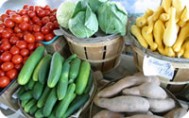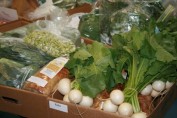Cooperatives offer a way for producers to come together and sell in a way that benefits producers, sellers, and consumers. These organizations have proven to be valuable to many of our clients, providing them with sustainable, secure revenue. Matson Consulting understands the vital role cooperatives play in the agricultural industry and maintains an interest in partnering with them for success. We have assisted many cooperatives – from startups to long-standing operations – with organization, stabilization, expansion, and more.
Matson Consulting works closely with VAFAIRS to advance the development of regional producers and cooperatives. Through the Rural Cooperative Development Grant Program, we create business plans, feasibility studies, and strategic plans to help with startup, management, and expansion of rural cooperatives.
Our passion for the industry is evident in the many articles and reports we have published. Through these publications, we are able to assist numerous entities with their cooperative programs. We have also led multiple workshops and presentations on the benefits of cooperatives, cooperative formation and organization, and steps to success. Our extensive industry knowledge and experience makes us well-suited to helping you meet your rural cooperative goals.
Follow the links below to see some examples our publications and presentations on cooperatives.
Feasibility Analysis of a Prototypical Chestnut Cooperative
Completed in cooperation with the Virginia Foundation for Agriculture, Innovation and Rural Sustainability (VA FAIRS), the “Feasibility Analysis of a Prototypical Chestnut Cooperative” reviews the economic and technical possibilities of establishing a prototypical chestnut-selling cooperative in Virginia. The study takes a comprehensive look at all aspects of the project required to create a successful venture including the chestnut industry, farmer need, business organization and operation options, sales and marketing strategies, and applicable regulations. Additionally, the analysis includes a break-even financial model, as well as two scenario analyses looking at the effects of various changes to the model.
Food Hubs: An Evolution of the Co-op Business Model
This article, published in the USDA’s Rural Cooperatives magazine, discusses how food hubs demonstrate the effectiveness and benefits of cooperative business models. Through the user-ownership, user-control, and user-benefits principles, food hubs are able to benefit all of their members in ways that traditional businesses cannot, extending the cooperative spirit beyond only the producers. Producers, consumers, and workers all function as owners and thus are able to work together to create a cooperative that benefits everyone, as well as the community at large. Food hubs are quickly becoming the go-to form of cooperative agricultural structure, giving smaller producers the chance to expand.
The Role of Food Hubs in Food Supply Chains
Food hubs fulfill not only an economic need by providing new avenues for smaller scale local foods producers to market their products, but they also fulfill a social need by creating community-oriented connections in the marketplace long dominated by impersonal and far-off food companies. The number of food hubs has grown steadily over the past few years, fueled by the growing trend in local foods and community agriculture. Like traditional supply chains, food hubs are only as viable as demand allows, however, they are able to fill the local and healthy food demand in much better and more transparent ways. By using community and social missions to support financial goals, food hubs are reversing the way supply chains approach business and offer a flexible way for agricultural producers to market their product.
The Million Dollar Question: What is break-even and viability for different food hub models?
This presentation from James Matson and Jim Barham was given at the National Good Food Network seminar in affiliation with the Wallace Center | Winrock International. The presentation looks at food hub models and their viability. With smaller scale producers and limited food volume, food hubs often face the question of how they reconcile these problems with the volume needed to be successful. The webinar looks at multiple models which can work better for different situations depending on the hub’s needs. It provides general observations and assumptions about business practice that a potential or already operational food hub can analyze and apply to their individual situation to help remain a viable and successful business.





